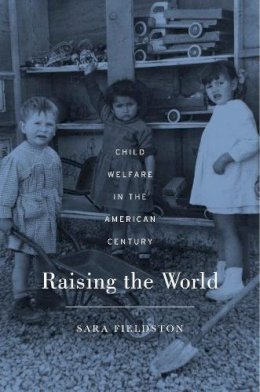
Raising the World: Child Welfare in the American Century
Sara Fieldston
After World War II, American organizations launched efforts to improve the lives of foreign children, from war orphans in Europe and Japan to impoverished youth in the developing world. Providing material aid, education, and emotional support, these programs had a deep humanitarian underpinning. But they were also political projects. Sara Fieldston’s comprehensive account Raising the World shows that the influence of child welfare agencies around the globe contributed to the United States’ expanding hegemony. These organizations filtered American power through the prism of familial love and shaped perceptions of the United States as the benevolent parent in a family of nations.
The American Friends Service Committee, Foster Parents’ Plan, and Christian Children’s Fund, among others, sent experts abroad to build nursery schools and orphanages and to instruct parents in modern theories of child rearing and personality development. Back home, thousands of others “sponsored” overseas children by sending money and exchanging often-intimate letters. Although driven by sincere impulses and sometimes fostering durable friendships, such efforts doubled as a form of social engineering. Americans believed that child rearing could prevent the rise of future dictators, curb the appeal of communism, and facilitate economic development around the world.
By the 1970s, child welfare agencies had to adjust to a new world in which American power was increasingly suspect. But even as volunteers reconsidered the project of reshaping foreign societies, a perceived universality of children’s needs continued to justify intervention by Americans into young lives across the globe.
Product Details
About Sara Fieldston
Reviews for Raising the World: Child Welfare in the American Century
M. E. Birk
Choice
This remarkable book brings private humanitarianism into the story of American global power during the Cold War. Moved to relieve suffering and express their commitment to love, peace, and international friendship, ordinary Americans and child welfare professionals ran headlong into the controversies of U.S. foreign and military policy. From postwar Europe and Japan to Korea and Vietnam, Fieldston shows us what happened when Americans and their government agreed that saving the world’s children was the foundation of reconstructing nations and remaking the world.
Ellen Herman, author of Kinship by Design: A History of Adoption in the Modern United States Raising the World is a major contribution, showing us the affective side of Cold War–era modernization theory. To inoculate poorer nations from communism, Americans embarked on a host of programs overseas. Sound emotional development and individual happy childhoods, these liberal reformers believed, were essential to world peace. A fascinating, nuanced study, Fieldston’s book is essential reading for those who want a better understanding of how ordinary Americans become invested in the project of American hegemony.
Naoko Shibusawa, author of America’s Geisha Ally: Reimagining the Japanese Enemy
